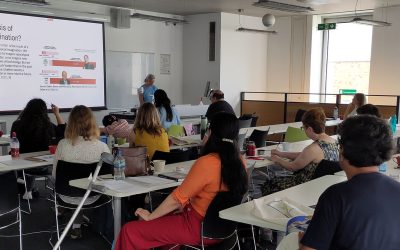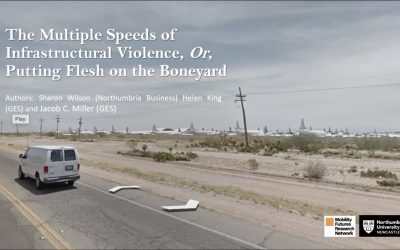 CeMoRe and the Department of Sociology at Lancaster University are thrilled to announce our John Urry Fellow for 2018-19, Thiago Allis, and to welcome him to Lancaster from 22nd January- 15th February 2019. Thiago will be the second awardee of the John Urry fellowship, taking over from last year’s fellow, Professor Gillian Youngs.
CeMoRe and the Department of Sociology at Lancaster University are thrilled to announce our John Urry Fellow for 2018-19, Thiago Allis, and to welcome him to Lancaster from 22nd January- 15th February 2019. Thiago will be the second awardee of the John Urry fellowship, taking over from last year’s fellow, Professor Gillian Youngs.
Thiago is Assistant Lecturer at the School of Arts, Sciences and Humanities (EACH), at University of São Paulo, Brazil. His main duties are teaching undergraduate courses in leisure and tourism and supervising research projects on various aspects of mobility and tourism (automobility and history, urban mobility and migration in relation to leisure and tourism). More about Thiago and his work here>>
Thiago will be hosting a seminar “Tourism mobilities: pursuing a new approach on tourism studies” on 4th February 2019, in FASS building Meeting Room 3, 12:00-14:30pm, Lancaster University. All are welcome, but please get in contact with us at cemore@lancaster.ac.uk to express your interest so that we can ensure there will be enough tea and coffees for all.
Tourism mobilities: pursuing a new approach on tourism studies.
Brazil in focus
The universe of certain leisure activities – including tourism – has only recently become part of the daily lives of a significant part of the world’s population – especially in the highly-populated nations of the so-called Global South. Combined with historically-consolidated tourism flows, it has been fuelling the expansion of new and larger infrastructures (airports, highways, resort complexes, tourist services in general, etc), increasing tourism and non-tourist supply to endless hordes of domestic and foreign travellers. In other words, as new waves of Chinese- for instance- take to the stage, no fewer Europeans will abandon their travel habits.
At the same time, when over-tourism rages in Europe, concerns about sustainability reach alarming levels, which does not fit the consumption increase of new segments of tourists eager for experiences. Thus, the clashes over the “right to tourism” in the context of multi-scale mobilities go beyond the well-known field of economics and bring about new references to cope with global tourism conceptually and empirically. All this is without forgetting the constrains between forced mobilities – which has never ceased in the history of mankind in the form of migrations, diasporas, etc- and the recent booming of desired mobilities (such as tourism, second homes and a large array of “lifestyle mobilities”).
In Brazil, recent changes offer fertile elements that raise new issues regarding tourism studies. If, on the one hand, socioeconomic changes allowed new types of consumption (including tourism) and the country was at the centre of a so-called “megaevents era” (World Cup 2014 and Rio 2016 Olympics), on the other, racist and classist structures remain, constraining the incorporation of the this new tourist – along with the “new middle-classes” – in the daily life of the country. For instance, while air traffic more than tripled from 2000-2015, there have been documented cases of prejudice against passengers whose behaviour is not deemed to fit a society driven by elitist standards.
How, then, can we understand theoretically, in the light of the mobility turn and the New Mobilities Paradigm, a phenomenon that has been consolidating for over 200 years, but has been covered by such complex contours in the dawn of the 21st century?
An analytical review is then proposed: besides a commercial object, tourism is a human phenomenon, involving the obvious flows of people, but also the constitution of images and models, impacting spaces and social groups in many ways worldwide. In other words, it is urgent to reconsider the functionalist rationale on tourism, disseminated by multilateral agencies and global capitalism, towards a more sensitive approach. To support this discussion, the Brazilian context will be presented, as an attempt to deepen the complexity that tourism encompasses, as opposed to the mainstream culture of tourism. To this end, the literature on tourism mobilities – if emerging, not large – will be taken into account.
“To engage with CeMoRe team, an auspicious think tank for mobilities within the social sciences, is an outstanding opportunity to improve theoretical work and also link with international scholars and researchers based in Lancaster”.
In addition, during his stay, Thiago will work closely with CeMoRe’s director, Professor Monika Buscher, in order to develop a digital platform aiming to organize and facilitate public and virtual access to John Urry’s private library, which has been donated to the University of São Paulo and will soon be transferred there. Indeed, this collection should contribute greatly to increase mobility research in Brazil and Latin America, allowing other researchers to get in touch with this subject and to propose other initiatives that continue reverberating the brilliant thoughts on mobilities unfolded by John and many of his colleagues. Additionally, he will be hosting a reading group, the details of which are to be announced soon.
Thiago Allis: Assistant Lecturer at School of Arts, Sciences and Humanities, at University of São Paulo (Brazil). John Urry Fellow 2018-2019. Email: thiagoallis@usp.br
Image source: Sergio Souza



